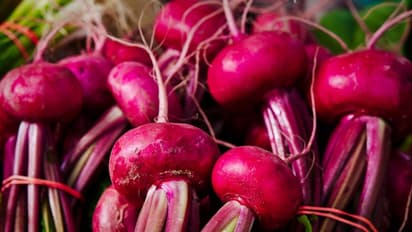Here are 7 health benefits of beetroot, check them out
Published : May 17, 2023, 09:11 PM IST
Beets often have a red colour and an earthy flavour. They are well-recognised to include several vitamins, minerals, and antioxidants. They can be eaten uncooked, cooked, or even juiced. Beets, one of the healthiest vegetables, are a powerhouse of vital elements that the body needs. Read on to learn more about beetroot's advantages.
Explore the latest Lifestyle News covering fashion, wellness, travel, Food and Recipes, and more. Stay updated with trending Health News, fitness tips, and expert insights to inspire your daily living. Discover personalized lifestyle trends that keep you stylish and informed. Download the Asianet News Official App from the Android Play Store and iPhone App Store for everything that adds value to your everyday life.
